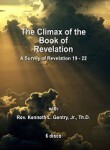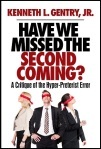HYPERPRETERISM VS. THE GOSPEL (3)
PMW 2025-060 by Kenneth L. Gentry, Jr.
Introduction
This is my third and final article in a short series on 1 Corinthians. I am showing that Paul is warning the Corinthians that denying the physical resurrection ends up denying the gospel. Thus, 1 Corinthians should serve as a warning to any Christians being tempted by hyper-preterism and its neo-Gnostic spiritual resurrection of the body. Sadly, hyper-preterists who teach a “spiritual” resurrection instead of a “bodily” resurrection are adopting humanism over biblicism.
The wisdom of the world
Once again, I am beginning with Paul’s first major section opening the main body of his epistle: 1 Cor. 1–4. In this section, which is the foundation for the whole epistle, Paul is warning against the wisdom of the world (i.e., that of fallen man) as he sets it over against the wisdom of God, which is found in Paul’s preaching. In 1 Cor. 3:18 he expresses concern about some “among” the Corinthians who are teaching the wisdom of the world in the church there [1]:
“Let no man deceive himself. If any man among you [en humin] thinks that he is wise in this age [sophos … en to aioni touto], he must become foolish, so that he may become wise. For the wisdom of this world [sophia tou kosmou toutou] is foolishness before God. For it is written, ‘He is the one who catches the wise in their craftiness’; and again, ‘The Lord knows the reasonings of the wise, that they are useless.’ So then let no one boast in men.”
According to William Baird and others, in this opening section of the main body of his letter (chs. 1–4), Paul establishes an important point. He sets human wisdom or philosophy (logos and sophia) over against God’s wisdom and word (logos and sophia). God’s wisdom comes in power to them through Paul:
“my message [logos] and my preaching [keriugma] were not in persuasive words of wisdom [sophia], but in demonstration of the Spirit and of power, so that your faith would not rest on the wisdom of men [sophia anthropon], but on the power of God. Yet we do speak wisdom [sophian] among those who are mature; a wisdom [sophian], however, not of this age nor of the rulers of this age, who are passing away; but we speak God’s wisdom [theou sophian] in a mystery.” (1 Cor. 2:4–7)
[image error]For more information and to order click here.
" data-image-caption="" data-medium-file="https://postmillennialworldview.com/w..." data-large-file="https://postmillennialworldview.com/w..." class="alignright size-full wp-image-209" src="https://postmillennialworldview.com/w..." alt="Navigating the Book of Revelation: Special Studies on Important Issues" />Navigating the Book of Revelation (by Ken Gentry)
Technical studies on key issues in Revelation, including the seven-sealed scroll, the cast out temple, Jewish persecution of Christianity, the Babylonian Harlot, and more.
See more study materials at: www.KennethGentry.com
Thus, in 4:19–21 Paul warns the humanistic troublemakers among the Corinthians:
“I will come to you soon, if the Lord wills, and I shall find out, not the words [logon, “word,” is in the singular, therefore it speaks of their teaching as a body of thought, their doctrine] of those who are arrogant but their power [dunamin]. For the kingdom of God does not consist in words [logo, singular, therefore teaching, doctrine] but in power. What do you desire? Shall I come to you with a rod, or with love and a spirit of gentleness?”
By this statement, Paul is relating his plan to come to them with a rod (i.e., to rebuke them). He will expose the fact that their words are arrogant pretension possessing no inherent divine power. This is much different from the true word of the kingdom which is very much a word of power — for it saves men, changing their lives (1:18; 2:4; 6:14; cp. Acts 8:13, 16). So then, Paul promotes his apostolic word (doctrine) over against the false philosophy of the world which is held and promoted by some in Corinth.
Three issues clustered
As James Ware points out, in 1 Cor. 1:17 Paul summarizes three significant issues for the Corinthians as he opens his letter. But these will not appear clustered together again until he reaches the letter’s climax in 1 Cor. 15 (as I will show below). Those three issues are: (1) his apostolic calling by the resurrected Christ; (2) his proclaiming of the gospel of Christ; and (3) the foundational nature of his preaching among those at Corinth. Note in this regard:
(1) Paul’s apostolic calling by Christ: “Christ did not send me to….” The word translated “send me” is apesteilen, from apostello, which means “to send with an authoritative commission.” We get our word “apostle” from this term. Paul was, in fact, authoritatively sent by Christ — though not for the purpose deemed significant by some among the Corinthians.
Thine Is the Kingdom
(ed. by Ken Gentry)
Contributors lay the scriptural foundation for a biblically-based, hope-filled postmillennial eschatology, while showing what it means to be postmillennial in the real world.
See more study materials at: www.KennethGentry.com
(2) Paul’s proclaiming the gospel: he was sent “to preach the gospel [eueggelisamen], not in cleverness of speech, so that the cross of Christ would not be made void.” Here Paul effectively equates “the gospel” with “the cross of Christ”; it is not a mere human philosophy. The phrase translated “in cleverness of speech” is en sophia logou. This literally means “in a word of wisdom,” which speaks of unaided, fallen human philosophy (cf. 1:19–21), “the wisdom of the world” (v. 20). Rather, Paul proclaimed the gospel regarding the cross of Christ.
(3) Paul’s founding of the church through preaching: “Christ did not send me to baptize.” Paul was sent by Christ to the Corinthians to preach so as to found a church (cf. Acts 18:8–10). He was not sent simply to baptize them in order to gain a following for himself (cf. vv. 12–15) — as if he was establishing a philosophical school. Baptism is the public rite of initiation into the church (Acts 2:41). Though Paul did not baptize many of them, he was the one who preached the gospel in its saving power to them, founding the church there at Corinth. In fact, he notes in 3:6 that he was the one who “planted” the church at Corinth, as we discover in the historical record in Acts 18:1, 8–11. Thus, he declares later in this main opening section (chs. 1–4): “I became your father through the gospel” (4:15).
As noted above, these three issues are not linked together in one cluster again until Paul arrives at his climax in 1 Corinthians 15. This will once again show the anticipatory nature of the opening of the letter as it moves toward Paul’s climax in chapter 15. There we see this collection of three issues pulled together once again in 1 Cor. 15:1–2, 9–11:
“Now I make known to you, brethren, the gospel [to euaggelion] which I preached [ho eueggelisamen] to you … by which also you are saved, if you hold fast the word which I preached [eueggelisamen] to you…. And last of all, as to one untimely born, He appeared to me also. For I am the least of the apostles [to apostolon] and not fit to be called an apostle [apostolos]…. Whether then it was I or they, so we preach and so you believed.”
 The Climax of the Book of Revelation (Rev 19-22)
The Climax of the Book of Revelation (Rev 19-22)
Six lectures on six DVDs that introduce Revelation as a whole, then focuses on its glorious conclusion. Provides an important, lengthy Introduction to Revelation also.
See more study materials at: www.KennethGentry.com
So in chapter 15 we notice once again the clustering of his three opening issues anticipated in 1:17: (1) Paul’s apostolic calling [he notes here that he is “the least of the apostles,” but an apostle nevertheless], (2) the gospel preached [“the gospel … preached”; “by which you are saved”], and (3) Paul’s own foundational preaching at Corinth [“the gospel I preached” and “we preach and so you believed”].
And Paul emphasizes that his preaching of the gospel was “not in cleverness of speech,” which literally is “in wisdom of word” (en sophia logou). That is, the gospel is not rooted in human philosophizing, the kind of wisdom that Greeks seek after (1:22; cf. Acts 17:17–21). Thus, in chapters 1–4 Paul strongly contrasts the “wisdom of the world” (1:19, 20, 21; 2:5, 6, 13, 19) with the “wisdom of God” (1:21; 24, 30; 2:7).
1 Corinthians 15 and the gospel
Not only is this the case, but Paul’s gospel, which is first mentioned in 1:17 by way of anticipation, is finally summarized and defined in 15:1–11. Note that in 15:1–2 we read the summary statement that he is emphasizing for their understanding: “Now I make known to you [gnorizo de humin], brethren, the gospel [to euaggelion] which I preached to you [ho eueggelisamen humin].” Indeed, this is the gospel by which they “are saved.” He is now going to explain in some detail his view of the “gospel.”
So, in verses 3–4 Paul declares the gospel as of “first importance” for it involves Christ’s death, burial, and resurrection. Then in verses 5–11 he proves Christ’s resurrection by listing many people who saw him afterwards. This listing of witnesses includes 500 brethren, “most of whom remain until now” (v. 6; cp. Acts 1:22; 2:32; 3:15; 5:32; 10:39). He mentions that most of these are still alive to inform the church that they could thus be contacted as witnesses for confirmation of his resurrection, if need be. For as Gordon Fee notes this “functions as a kind of open-ended invitation for the Corinthians to inquire for themselves.”
[image error]For more information and to order click here.
" data-image-caption="" data-medium-file="https://postmillennialworldview.com/w..." data-large-file="https://postmillennialworldview.com/w..." class="alignright size-full wp-image-495" src="https://postmillennialworldview.com/w..." alt="" />God Gave Wine (by Ken Gentry)
A biblical defense of moderate alcohol consumption. Considers all key biblical passages and engages the leading objections.
See more study materials at: www.KennethGentry.com
Here Paul is clearly presenting Christ’s resurrection as a physical resurrection. The one whose body was buried is the same one whose body was raised. The Gospel record is clear about the physical nature of Christ’s resurrection. (1) Early in his ministry Jesus promised: “Destroy this temple and in three days I will raise it up,” which referred to his body (John 2:19–22). (2) It records the fact of the empty tomb (Matt. 28:11–15; Mark 16:1–8; Luke 24:1–12; John 20:1–11). (3) The risen Lord showed the disciples his “flesh and bones” in order to prove that he was not a “spirit” (Luke 24:38–39). (4) He showed the disciples the wounds in his body (John 20:2). And more!
And in 1 Cor. 15 Paul emphasizes the bodily character of our resurrection, for it is preceded by Christ’s resurrection, which serves as the “first fruits” (1 Cor. 15:20, 23; cp. Col. 1:18). Furthermore it is called a “raising up” (egeiro, 15:4, 12–17, 20, 29, 32, 35, 43–44, 52). The verb egeiro means “get up” or “rising to stand,” often from a sleeping position. According to Ware, “in no instance within ancient Greek literature does egeiro denote the concept of ascension elevation, or assumption. Rather, it denotes the action whereby one who is prone, sitting, prostrate, or lying down is restored to a standing position.” [2]
Ancient philosophy and resurrection
But no ancient philosophy or religion (beyond Israel) believed in a permanent resurrection of the body, though some allowed a temporary resuscitation of the dead. In fact, ancient philosophy denied the very possibility of such. For instance, Christian philosopher and theologian James Ware records many of the ancient philosophers on the subject. He notes regarding ancient philosophers and religionists “all were agreed on the impossibility of resurrection — return from bodily death to an everlasting embodied life. No philosopher, regardless of school, envisioned that a human being, once dead, might live again.”
Ware notes that the poet Anacreon wrote that “no one who goes down to the grave will ever come up again.” Athena explained in the Odyssey that “a god if he wished can easily rescue a living man, even from afar…. But surely not even the gods can deliver anyone, even one they love, from death, the common fate of all.” The god Apollo declared in Eumenides: “There can be no resurrection. All other things his [Zeus’s] mighty power can do or undo with effortless ease, but for death alone my father Zeus has no divine enchantment.”
But in Israel (alone among the nations, philosophies, and religions of the world), the Jews held to a bodily resurrection from the dead. We see this represented in the Old Testament (Job 19:25–27; Isa. 25:7, 19; Dan. 12:2 [3]) and among the early Jews, such as the Pharisees (2 Macc. 7:9), and in 1 Enoch 22–27; 45:4–5; 51:1–5; Jubilees 1:29; Testament of Judah 24; Sybylline Oracles 4:179–93, the Mishnah (10:17), and other Rabbinic writings. Indeed, the hope of the resurrection was “the hope of Israel “ (Acts 28:20)
Have We Missed the Second Coming:
A Critique of the Hyper-preterist Error
by Ken Gentry
This book offers a brief introduction, summary, and critique of Hyper-preterism. Don’t let your church and Christian friends be blindfolded to this new error. To be forewarned is to be forearmed.
For more Christian educational materials: www.KennethGentry.com
Of course, the Sadducees famously denied the resurrection, while the Pharisees (along with Paul) acknowledged it:
“But perceiving that one group were Sadducees and the other Pharisees, Paul began crying out in the Council, ‘Brethren, I am a Pharisee, a son of Pharisees; I am on trial for the hope and resurrection of the dead!’ As he said this, there occurred a dissension between the Pharisees and Sadducees, and the assembly was divided. For the Sadducees say that there is no resurrection, nor an angel, nor a spirit, but the Pharisees acknowledge them all.”
Paul vs. proto-Gnosticism
So Paul confronts the proto-Gnostic error that denies the physical resurrection by challenging “some” in Corinth: “Now if Christ is preached, that He has been raised from the dead, how do some among you say that there is no resurrection of the dead?” (1 Cor. 15:12). These “some” are the ones Paul warned about in his first major section of the body of his the letter, who held to the wisdom of the world:
“Now some have become arrogant, as though I were not coming to you. But I will come to you soon, if the Lord wills, and I shall find out, not the words of those who are arrogant but their power.” (4:18–19)
The false teaching of “some” in Corinth involves arrogant words, teaching, doctrine. But they do not possess “power.” Whereas “the kingdom of God does not consist in mere words but in power” (v. 20).
Conclusion
Therefore, to deny the physical resurrection of the dead is to adopt the wisdom of the world. It is to deny the power of God. Demonstrating this was the goal of Paul’s letter to the Corinthians, which is anticipated in its opening section (1:17; and chs. 1–4).
Notes
1. In an earlier article in this series, we saw that these “some” are denying or questioning the resurrection of the dead, 15:12, 35.
2. For further evidence that 1 Cor. 15 speaks of a bodily resurrection, see my six-part series “Stand Firm in the Resurrection Hope,” which is on this site [PMW 2025-033–38]. That series explains the proper interpretation of the “spiritual body” and other confusing issues in 1 Cor. 15.
3. Regarding the resurrection in Dan. 12:2, it appears that Daniel is drawing on the fact of the resurrection and applying it to the rejuvenation of Israel. Nevertheless, the fact of resurrection must be true or else the application in a different context would be pointless. See: Daniel 12:2 article.
Kenneth L. Gentry Jr.'s Blog
- Kenneth L. Gentry Jr.'s profile
- 85 followers



